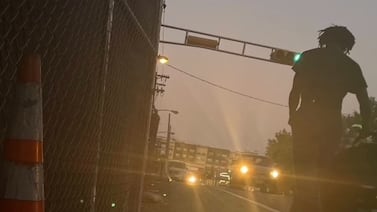Sign up for Chalkbeat Tennessee’s free daily newsletter to keep up with Memphis-Shelby County Schools and statewide education policy.
Two of the Memphis activists who were banned in May from entering Memphis-Shelby County Schools property lost a bid in court to have their bans lifted early.
But a federal judge said Friday that the merits of their broader case against the school district will depend on answers to several pending questions, including how the district decides whether to issue such bans and what its policies are on regulating public comment.
The bans on the two activists — LJ Abraham and Amber Sherman — are due to expire Friday. They are among five activists who were barred from entering school buildings and board offices after a tense board meeting in May involving the district’s search for a new superintendent.
The bans on the other three — Damon Curry Morris, Tikeila Rucker, and Rachael Spriggs — had already expired, and the judge ruled their request for an injunction moot.
The orders to ban the activists from district property, first issued through the district and the Memphis Police Department, threatened them with criminal trespassing charges if they violated the ban. In initial statements to the media following the May meeting, district officials said the bans were due to “disruptive” behavior and threats to public safety.
The district later provided their first explanations of the bans in letters to the activists that also included the expiration dates.
The five sued in federal court in June, alleging that MSCS was “conspiring” to prevent them from advocating for a transparent process to hiring the next superintendent. Their attorneys asked a judge for an injunction lifting the bans on the grounds that the district had violated their constitutional rights to access public meetings.
But U.S. District Judge Sheryl H. Lipman wrote in her ruling late Friday that the activists hadn’t provided the court evidence that they were banned “because of the viewpoints they expressed.” She dismissed an argument from the plaintiffs’ attorney that, without an injunction, the district would be likely to issue more bans against the activists as their lawsuit proceeds.
Abraham and Sherman have acknowledged that they dropped small devices that made an alarm sound at the end of the May meeting.
The alarms figured prominently in testimony and arguments for the district during a hearing on the injunction July 13. MSCS’ top security official, Carolyn Jackson, a named defendant in the suit, testified that the activists posed safety threats.
Attorneys for the activists “presented no evidence rebutting Jackson’s testimony,” Lipman wrote.
But her ruling said she had several remaining questions about how district officials decided to issue the bans and communicate them, about what governs those decisions, and about policies governing public comment. Answers to those questions will help determine whether the bans are constitutional, Lipman wrote.
Lipman said at the July hearing that regardless of her ruling on the preliminary injunction, she expected the case over the bans to continue, acknowledging that it raises “important issues.”
Ben Gastel, the attorney for the activists, told Chalkbeat: “We look forward to proceeding with the next phase of this case and ensuring that our clients constitutional rights are protected and preserved.”
Attorneys for MSCS did not respond to requests for comment Monday.
The case is set for non-jury trial in October 2024.
Laura Testino covers Memphis-Shelby County Schools for Chalkbeat Tennessee. Reach Laura at LTestino@chalkbeat.org.








